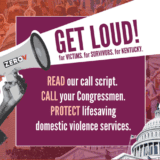How to #SupportSurvivors during COVID-19
This post is part of our COVID-19 Response series to provide regular updates on services for survivors during the coronavirus public health crisis.
Home isn’t always a safe place to isolate.
Domestic violence offenses result in approximately 40 deaths in Kentucky annually. For many survivors, home can be the most dangerous of places. Not having the option to leave heightens the risk of violence.
Intimate partner abuse is rooted in power and control. During stay-at-home orders, this control may be exerted by using “social distancing” as means to further isolate survivors from supportive friends and family. Abuse of power could also include forcing a survivor to leave the home and risk exposure. This recent article from Cosmopolitan magazine shares more stories of survivors caught in a cycle of abuse during coronavirus isolation. One survivor was forced to wash her hands over and over until they were raw and bleeding.
We must come together and be the neighbors that survivors need. Reach out, check in, and make space for the conversation. Never make a presumption of what home may have violence or may not have violence because intimate partner abuse doesn’t discriminate. It might be difficult to begin the dialogue at first, but being direct always works. Try questions like these: “Are you well?”, “Are you safe?”, and “Are things safe for you right now in the home?”
Step-by-Step: How to #SupportSurvivors
- Reach out to those you may suspect are at risk of violence.
- Text and social media often are monitored by abusers, so sometimes a phone conversation is safer.
- Ask if they’re safe right now.
- Listen more than you talk. Believe the stories they tell you, and avoid saying what you would do.
- Instead, say you are really worried about their safety and ask if they have a safety plan.
Many safety plans suggest creating code words that a friend or family member can text or say to ask for help. For example, “pineapple” could mean to call the police or “apple” to come over. A survivor may decide to stay, even though they are being abused. Honor this decision. Sometimes, it’s because leaving wold be more dangerous right now. Your role is to help them make their own decisions, not rescue them.
Our friends at the Lexington Domestic & Sexual Violence Prevention Coalition wrote this wonderful resource with more tips to reach out safely and effectively during times of social isolation. Most importantly, we must ensure that survivors know they’re not alone. People and organizations are here to support them, and we’re not going anywhere. If you have any questions or concerns, please do not hesitate to call our 24-hour hotline: 800-544-2022.
Listen. Believe. Empower.








